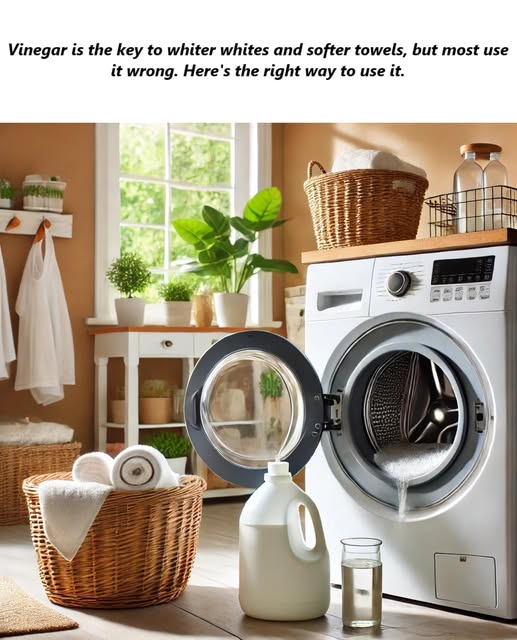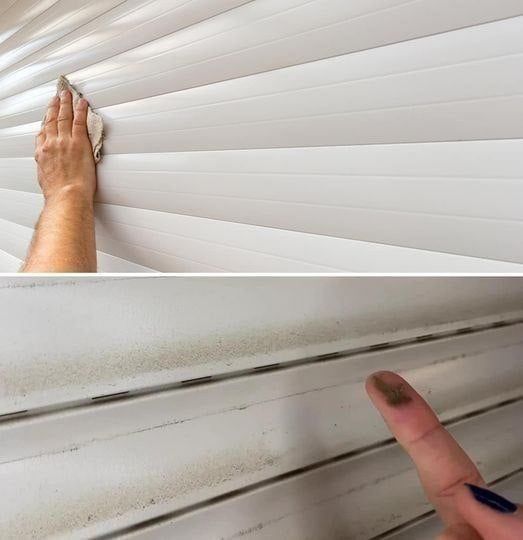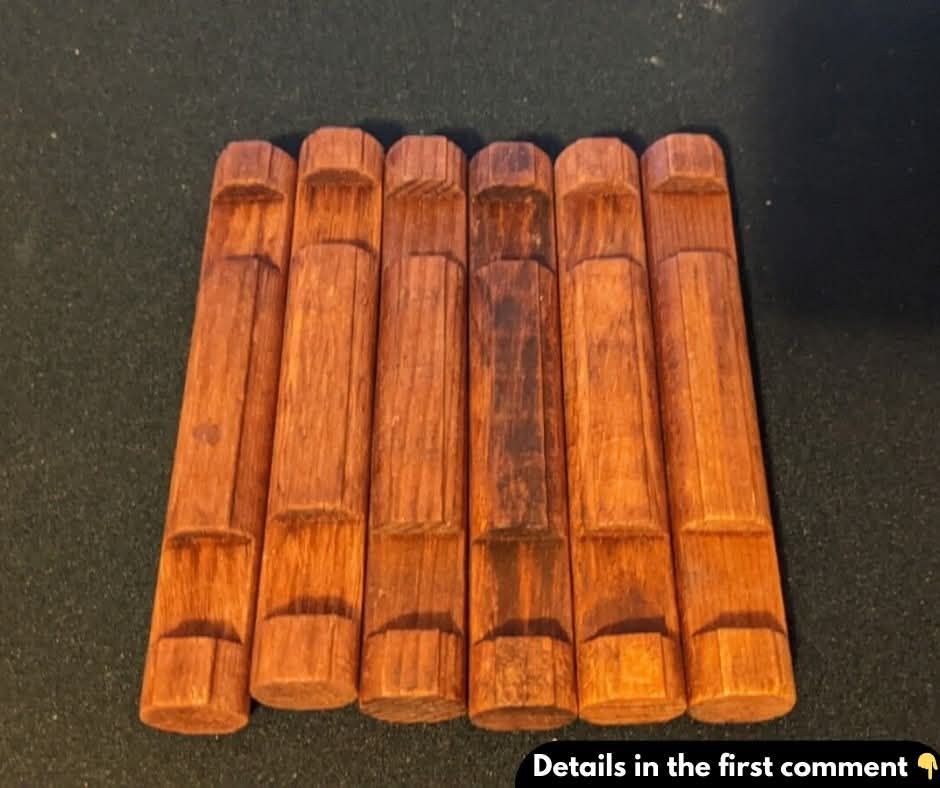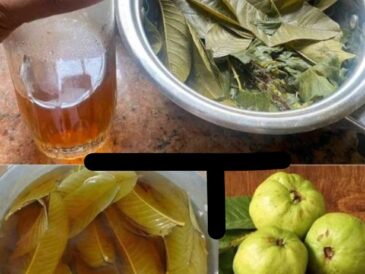Vinegar is one of those versatile household staples that’s been around for centuries, finding its place in kitchens, cleaning routines, and even as a natural remedy for various ailments. However, what many people don’t realize is that vinegar can also transform your laundry routine in a way you may never have imagined. It’s not just for cooking or as a surface cleaner—it can actually be the secret weapon for achieving whiter whites and softer towels, all without using harsh chemicals or expensive products.
If you’re tired of relying on expensive bleach or fabric softeners, this simple and affordable household ingredient can help you achieve the results you’re looking for. Yet, most people use vinegar incorrectly when it comes to laundry, missing out on its full potential. In this guide, we’ll show you the right way to use vinegar in your laundry routine, and explain how it works its magic to give your clothes and linens a fresh, clean boost.
How Vinegar Works to Whiten Whites and Soften Towels
While vinegar has many uses, its ability to clean and soften fabrics is particularly noteworthy. But how does it work its wonders on laundry? Let’s break it down:
1. Natural Bleaching Agent
Vinegar contains acetic acid, which is a weak acid that can break down dirt and stains on fabric. This mild acidity helps to dissolve grime, mildew, and other buildup without causing damage to the fabric. Unlike chlorine bleach, which can be harsh on clothes, vinegar provides a much gentler alternative for whitening your whites and freshening up your laundry.
The acidic properties of vinegar can lift stains without weakening or degrading the fabric. This makes vinegar a much safer and more fabric-friendly alternative to bleach. It also has the added bonus of not emitting the harsh fumes associated with chemical bleaches.
2. Fabric Softener Alternative
Have you ever pulled a towel out of the dryer, only to find it stiff and scratchy? This happens when fabric softeners leave behind chemical residues on towels and clothing, reducing their absorbency and making them feel less soft. Vinegar, however, works as a natural fabric softener. It breaks down these detergent residues left on your fabrics, leaving your towels feeling much softer and fluffier after just one use.
By using vinegar in place of traditional fabric softeners, you’re not only making your towels softer, but you’re also helping them maintain their full absorbency. Over time, this will help extend the lifespan of your towels and reduce the need for frequent replacements.
3. Odor Elimination
Vinegar is also an effective odor neutralizer. Its acidic properties help to break down and neutralize any lingering smells in your laundry. Whether it’s musty odors from towels, sweat from gym clothes, or even lingering food smells from your kitchen towels, vinegar can get rid of those unwanted scents. This is especially useful if you have sensitive skin, as vinegar is less likely to irritate than heavily scented fabric softeners.
4. Color Brightening
While vinegar is particularly effective on white fabrics, it also has the ability to maintain the vibrancy of colored fabrics. When used regularly, vinegar helps to dissolve any alkaline residues left by detergent, preventing colors from looking dull or faded. This is particularly beneficial for your dark-colored clothes, as vinegar can help keep them looking fresh and vibrant without the need for expensive color-safe detergents.
How to Use Vinegar in Your Laundry Routine: The Right Way
To get the most out of vinegar and ensure that your laundry looks its best, here are the key ways to incorporate vinegar into your laundry routine.
1. For Whiter Whites
One of the easiest ways to use vinegar in your laundry is to brighten your whites. If you’re looking for a simple way to get your whites looking fresh again, vinegar can help.
How to do it:
- Add one cup of distilled white vinegar to the rinse cycle of your washing machine.
- Make sure to add it during the rinse cycle rather than with the detergent. This allows the vinegar to break down any residue left behind by detergent or fabric softener, resulting in cleaner, brighter whites.
The vinegar will work as a natural bleaching agent, helping to lift dirt, grime, and stains from your clothes. Over time, this can help restore the brightness of your white fabrics without resorting to harsh chemical bleaches.
2. For Softer Towels
Towels are notorious for losing their softness after repeated washes. This is usually due to the buildup of detergent residue and fabric softeners, which can make towels feel stiff and less absorbent.
How to do it:
- Add half a cup of vinegar to the rinse cycle when washing your towels.
- Avoid using fabric softener, as this can add to the buildup. The vinegar will help to dissolve any residue left behind, making your towels softer, fluffier, and more absorbent.
By regularly using vinegar in your towel laundry routine, you can restore that plush, spa-like softness to your towels without resorting to commercial fabric softeners, which often leave behind harsh chemicals.
3. For Stain Removal
If you’re dealing with tough stains, vinegar can also be used as a pre-treatment for fabric stains before washing.
How to do it:
- Mix one part vinegar with two parts water in a spray bottle.
- Apply the solution to the stained area and let it sit for 15 to 30 minutes before washing.
Vinegar helps to break down oils and stains, making them easier to wash out. This works well on stains from food, sweat, and other common laundry mishaps. You can use this technique on all types of fabrics, from delicate clothing to heavily soiled towels.
4. For Removing Mildew
If you have towels, sheets, or clothing that have developed a mildew smell from being left damp for too long, vinegar is your ally.
How to do it:
- Soak the affected items in a solution of one part vinegar and one part water for about 30 minutes before laundering them as usual.
- For particularly stubborn mildew odors, you can add a cup of vinegar to your washing machine along with your regular detergent.
Vinegar effectively eliminates mildew smells by neutralizing the bacteria responsible for the odor. It’s a natural way to refresh linens that have been sitting damp, without resorting to harsh chemical cleaners.
5. To Keep Your Washer Clean
Vinegar isn’t just good for your laundry—it’s also great for maintaining your washing machine.
How to do it:
- Run an empty load with two cups of vinegar on the hottest cycle.
- This helps to break down limescale, soap scum, and detergent buildup inside your machine, keeping it fresh and clean.
Doing this once every few months can help prolong the life of your washing machine and ensure it continues to work at its best.
Additional Tips for Best Results
- Use Distilled White Vinegar: When using vinegar in your laundry, make sure to use distilled white vinegar. Other types of vinegar, such as apple cider vinegar or balsamic vinegar, can stain fabrics due to their natural colors.
- Avoid Mixing Vinegar with Bleach: While vinegar is a powerful cleaner, it should never be mixed with bleach. The combination can produce harmful fumes, so use them separately and never at the same time.
- Add Essential Oils for Scent: If you love the smell of freshly washed laundry, add a few drops of essential oil (like lavender or lemon) to the vinegar before adding it to your wash. This can give your laundry a pleasant scent without the synthetic chemicals found in many fabric softeners.
- Don’t Overuse: While vinegar is a great tool for laundry, overusing it can result in an overpowering smell that can linger on your fabrics. Stick to the recommended amounts to avoid any unpleasant vinegar scents.
Why Vinegar is Better than Commercial Products
If you’re used to relying on store-bought fabric softeners or bleach, you may wonder why vinegar is a better choice. There are a few key reasons why vinegar outperforms traditional laundry products:
- Eco-Friendly: Vinegar is biodegradable and safe for the environment. Unlike harsh chemicals found in many commercial products, vinegar doesn’t pollute the air or water supply when used properly.
- Chemical-Free: Vinegar is a natural substance with no synthetic chemicals, fragrances, or dyes. This makes it a safer option for those with sensitive skin, allergies, or respiratory issues.
- Affordable: Vinegar is an inexpensive option compared to specialty detergents or fabric softeners. A single bottle can last for many loads of laundry, making it a cost-effective solution.
- No Residue: Unlike fabric softeners, which leave a coating on fabrics, vinegar doesn’t leave any residue behind. This ensures that your laundry remains soft, fresh, and absorbent.
Conclusion
Vinegar is a laundry game-changer, offering a natural, affordable, and effective way to achieve whiter whites, softer towels, and fresher laundry. By using it correctly—adding it to the rinse cycle, using it for stain removal, or soaking towels with mildew—you can completely transform your laundry routine. Vinegar’s natural bleaching and softening properties, combined with its odor-neutralizing abilities, make it a must-have for every laundry room. Try it out today and see for yourself why vinegar might be the missing ingredient in your laundry routine.





